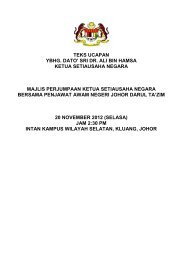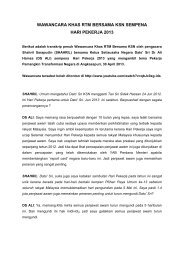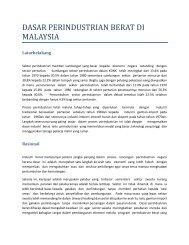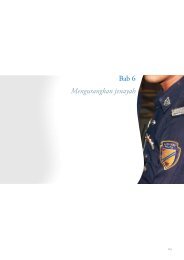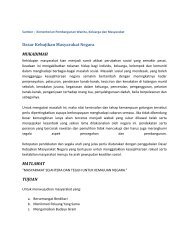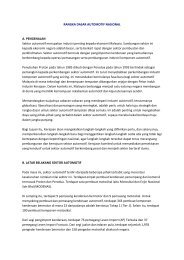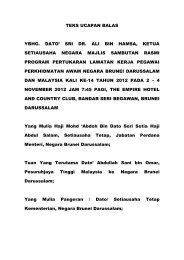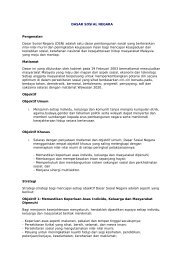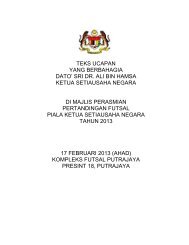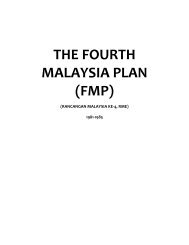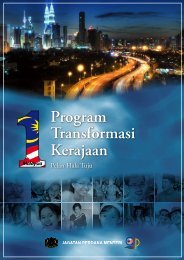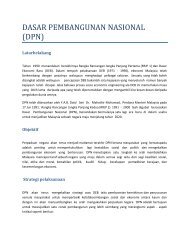GTP 2.0 - Prime Minister's Office of Malaysia
GTP 2.0 - Prime Minister's Office of Malaysia
GTP 2.0 - Prime Minister's Office of Malaysia
Create successful ePaper yourself
Turn your PDF publications into a flip-book with our unique Google optimized e-Paper software.
REsPoNDING to CRImE PattERNs<br />
The Reducing Crime NKRA (CRI NKRA), similar to the Addressing<br />
the Rising Cost <strong>of</strong> Living Rising Cost <strong>of</strong> Living NKRA (COL<br />
NKRA), is distinctive in that its initiatives are prescriptive<br />
and reactive at the same time. As with the COL NKRA, the<br />
initiatives against crime must adapt to changing external<br />
conditions, in this case namely changing crime patterns.<br />
From this perspective, the initiatives <strong>of</strong> the CRI NKRA vary<br />
from year-to-year correlated to the rise and fall <strong>of</strong> different<br />
types <strong>of</strong> crime. In 2012, for example, a spate <strong>of</strong> snatch thefts<br />
and assault cases occurring in public parking lots spurred<br />
the NKRA to take immediate steps to prevent re-occurrence.<br />
The CRI NKRA team quickly arranged engagement sessions<br />
with public parking lot operators and owners <strong>of</strong> commercial<br />
buildings such as shopping malls to help strengthen their<br />
security measures. Meanwhile, the CRI NKRA also introduced<br />
motorcycle locks in specific areas where motorcycle theft<br />
rates had risen.<br />
Although some <strong>of</strong> the initiatives <strong>of</strong> the CRI NKRA are reactive,<br />
its overall strategy remains purposeful in the sense that it<br />
is charged with reducing overall crime levels and creating a<br />
safer and more secure environment for the rakyat.<br />
The adaptability <strong>of</strong> the CRI NKRA is not focused on initiatives<br />
exclusively, however. For instance, in 2012 there was a rise in<br />
the feelings <strong>of</strong> insecurity by the rakyat partly in response to<br />
a spate <strong>of</strong> visible crimes. Although the CRI NKRA upholds that<br />
the country is safer from a data perspective, there remains a<br />
need for the NKRA to reassure the rakyat as well.<br />
The CRI NKRA team felt that the reason public feeling <strong>of</strong><br />
security remained low was that positive action that reduces<br />
crime has little visibility compared to highly public instances<br />
<strong>of</strong> crime itself. Thus, there was need better to engage the<br />
public and raise awareness about the activities <strong>of</strong> the NKRA,<br />
as well as a need better to equip the rakyat to minimise their<br />
risk <strong>of</strong> becoming victims <strong>of</strong> crime.<br />
Meanwhile, the NKRA also enhanced its existing<br />
initiatives in response to changing crime<br />
patterns, and managed to reduce index crime by<br />
a further 8.7% in the first 10 months <strong>of</strong> 2012. A<br />
number <strong>of</strong> minor initiatives were also introduced<br />
to further improve police services in the central<br />
business districts (CBDs). Outcomes delivered by<br />
the NKRA in 2012 include:<br />
outComE 1<br />
Expanding the Omnipresence<br />
programme<br />
The flagship programme <strong>of</strong> the CRI NKRA was<br />
expanded in 2012 to target schools, shopping<br />
centres, wet markets, public transport<br />
terminals and foreign embassies. The<br />
additions to the programme were made<br />
in response to the rise <strong>of</strong> criminal incidents<br />
in those areas.<br />
outComE 2<br />
Enhancing the Safe City<br />
Programme<br />
The programme has been expanded to 151<br />
local district authorities (Pihak Berkuasa<br />
Tempatan or PBTs) including all 12 hotspot<br />
PBTs, which aim to deliver the provisions <strong>of</strong><br />
the programme within their own jurisdictions.<br />
The Safe City Programme saw the introduction<br />
<strong>of</strong> two new initiatives that will further<br />
promote security within specific city areas.<br />
The CRI NKRA implemented an initiative to<br />
install motorcycle locks in central business<br />
districts (CBDs) in a bid to further reduce<br />
incidences <strong>of</strong> vehicle theft. Meanwhile, new<br />
signage detailing police contact information<br />
was set up in community areas to enhance<br />
police response time. In addition, safety audits<br />
were conducted for 467 public toilets and<br />
132 public transport terminals within the 12<br />
hotspot PBTs.<br />
outComE 3<br />
Greater engagement with target groups<br />
The CRI NKRA implemented the United Against Crime public engagement campaign with the<br />
aim <strong>of</strong> enhancing relationships between the PDRM and the community. Key groups targeted in<br />
2012 were women, schools, resident associations and the private sector including businesses,<br />
car park operators and embassies.<br />
Women: Among the initiatives were round-table discussions with women on the subject <strong>of</strong><br />
domestic violence, which directly leads back to the NKRA’s efforts to reduce the number <strong>of</strong><br />
victims <strong>of</strong> crime. The CRI NKRA also expanded triage services to provide additional support<br />
for victims <strong>of</strong> crime at police stations.<br />
Schools: The NKRA focused on engaging with school children following a high-pr<strong>of</strong>ile<br />
kidnapping case last year. Under the Blue and Green initiative, joint patrols were held by<br />
PDRM and RELA to increase the security in over 500 schools nationwide.<br />
Resident Associations (RAs): Dialogue sessions between the police and RAs started this<br />
year to help identify local issues and help communities improve safety within their<br />
own neighbourhoods. It also gave residents a chance to provide feedback to the PDRM<br />
with respect to security and policing issues. The PDRM also instituted the Hari Bertemu<br />
Pelanggan, or Customer Meeting Day, at their stations every first Thursday <strong>of</strong> the month to<br />
promote better community relationships. These engagement sessions were also held to lay<br />
down the foundation for the Black Spot Initiative in <strong>GTP</strong><strong>2.0</strong>.<br />
Car park operators: In anticipation <strong>of</strong> the NKRA’s new initiative in <strong>GTP</strong> <strong>2.0</strong> to harden<br />
public car parks, engagement sessions were held in 2012 to prepare the operators. The<br />
engagement sessions were also held to help operators improve security after a spate <strong>of</strong><br />
criminal incidences at public car parks.<br />
KPI<br />
Reduction in reported<br />
index crime<br />
Reduction in reported<br />
street crime<br />
Reduce fear <strong>of</strong> becoming<br />
a victim <strong>of</strong> crime<br />
Increase the number <strong>of</strong> arrest cases<br />
brought to trial (charge rate)<br />
Improve public perception<br />
on police performance<br />
NKPIs<br />
2012 Target<br />
5%<br />
5% based on 2011 achievement<br />
45%<br />
45% based on 2009 achievement<br />
58 Government transformation Programme—Annual Report 2012 Chapter Four 59<br />
Government transformation Programme—Annual Report 2012 Chapter Four<br />
45%<br />
25%<br />
65%<br />
2012 Results<br />
7.6%<br />
41.3%<br />
57.3%<br />
34.7%<br />
65.7%



